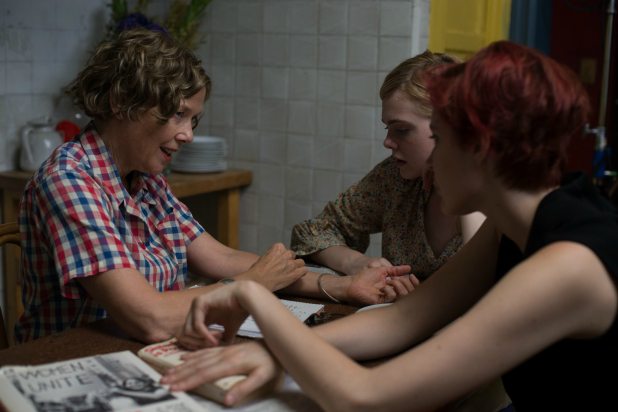
 20th Century Women asks the question, “how do you raise a good man?” But its title also suggests it is asking a lot more about women. The three female leads, played by Annette Bening, Greta Gerwig, and Elle Fanning are each presented with specific birth dates. Spaced out through the 20th century as those dates are, we are led to conclude, these are our 20th century women! Where to go from there isn’t totally clear.
20th Century Women asks the question, “how do you raise a good man?” But its title also suggests it is asking a lot more about women. The three female leads, played by Annette Bening, Greta Gerwig, and Elle Fanning are each presented with specific birth dates. Spaced out through the 20th century as those dates are, we are led to conclude, these are our 20th century women! Where to go from there isn’t totally clear.
Mike Mills, whose most recent movie Beginners won Christopher Plummer an Oscar, has written another generally pleasing movie about relationships at many ages. His new movie tells the story of Jamie (Lucas Jade Zumann), a fifteen-year-old in 1979 Santa Barbara. He lives with his single mother Dorothea, played by Annette Bening, and two tenants: an aimless handyman that speaks in hippie argo played by Billy Crudup and Abbie (Greta Gerwig), a photographer who had been a punk on the East Coast before moving back to California. Julie (Elle Fanning) does not live in the crumbling mansion but she sneaks into Jamie’s bed almost every night to sleep (and only sleep) so she might just as well.
That paragraph covers not just the exposition, but most of the plot as well. That question about raising Jamie doesn’t get much play in a tepid movie with little tension or movement. Jamie experiences a lot, but he doesn’t really grow too much. Throughout the movie, he repeatedly assures his mom that he’s fine, and I can confirm that, basically, he is.
So this brings us back to the women. Whatever conflict actually exists in the movie emerges between the female leads. Dorothea chafes slightly at Abbie’s didactic feminism, and can’t really understand the music of the youth. At times, the three can seem like a tableau in each defining ‘wave’ of feminism: Dorothea is a self-possessed, professional woman who reads as a lesbian to younger coworkers; Abbie forces an entire dinner party to repeat “menstruation” in a mature, rational manner; and Julie has sex freely with a parade of inconsiderate boys, because at least they aren’t demanding feelings from her!
You don’t really get much more out of it than that fleeting impression, though. Whatever you take away from this movie, you have to dig down and scavenge yourself as it favors tone and impressions over anything more substantive. You do get epilogues that detail whether or not the female leads have children eventually. Was this a burning question? I suppose it was an element of Abbie’s plotline, as she was recovering from cervical cancer. But to cap off the whole movie on that note? I had not realized that a movie called 20th Century Women would be so focused on ovaries. Here’s to moving on the to the 21st.